Session Two - Exodus, Law and Conquest
Introduction
Week One concluded with the account of Jacob and his sons and their families established in Egypt at the end of Genesis. Exodus begins several centuries later with their descendants in slavery in Egypt, partly because the Egyptians needed slave labour and partly for national security reasons. Enter Moses, adopted son of Pharaoh's daughter and the man destined by God to lead them into freedom.
Overview of Books
Exodus
Exodus describes the departure of the Israelites from Egypt after 400 years of slavery. The book lays a foundational theology in which God reveals his name, his attributes, his redemption, his law and how he is to be worshiped. Major events: the people in slavery; the call of Moses at the burning bush; the plagues in Egypt; judgement at the Red Sea; wanderings, encounter with God at Mt Sinai. Key ideas: the supremacy of Jehovah (or Yahweh - same name) over pagan deities; the exodus as a redemptive event for ancient Israel; the Law of Moses as a religious and social charter for Israel; the presence of God through the Tabernacle.

Moses and the Exodus
Moses was the son of Amram and Jochebed of the tribe of Levi. Miriam and Aaron were his brother and sister. He was born in Egypt during the period in which the Hebrews had become a threat to the Egyptians because of their large population. Pharaoh had ordered that all newborn male Hebrew children be cast into the Nile River to drown. Amram and Jochebed took their newborn son and placed him in a waterproof basket and hid him in the tall grasses of the Nile. Meanwhile, his sister Miriam hid and watched over the baby from a distance. A group of women and servants were bathing nearby. Pharaoh's daughter, hearing the baby cry, found and rescued him. She named him "Moses," meaning "drawn from the water." Moses was brought up in the splendor of the Egyptian court as the Pharaoh's daughter's adopted son.
Grown to manhood, Moses was aware of his Hebrew roots and seems to have shared a deep compassion for the welfare his confined kinsmen. He became furious while witnessing an Egyptian master brutally beating a Hebrew slave, and he impulsively killed the Egyptian. Fearing Pharaoh's punishment, he fled into the desert of Midian, becoming a shepherd for Jethro, a Midianite priest whose daughter Zipporah he later married.
While tending flocks on Horeb Mountain in the wilderness, Moses saw a bush burning yet not turning to ash. He heard a voice from within the bush telling him that he had been chosen to serve as one to lead the children of Israel out of Egypt. He was also told to declare the unity of God to his people. At that time most Israelites were worshipping false gods. Moses was to tell them that there was only one God.
Moses is also recognized as the mediator of the Old Covenant and is commonly referred to as the giver of the Law. The responsibility of Moses new task, his meekness, and his own feelings of unworthiness brought forth a hesitancy and lack of confidence. The Divine answer was "Who made your tongue?" He was then assured that Aaron, his more talkative brother, would serve as his spokesman both to the children of Israel and to Pharaoh. The promised destination for the Israelites' journey was a "land rich with milk and honey."
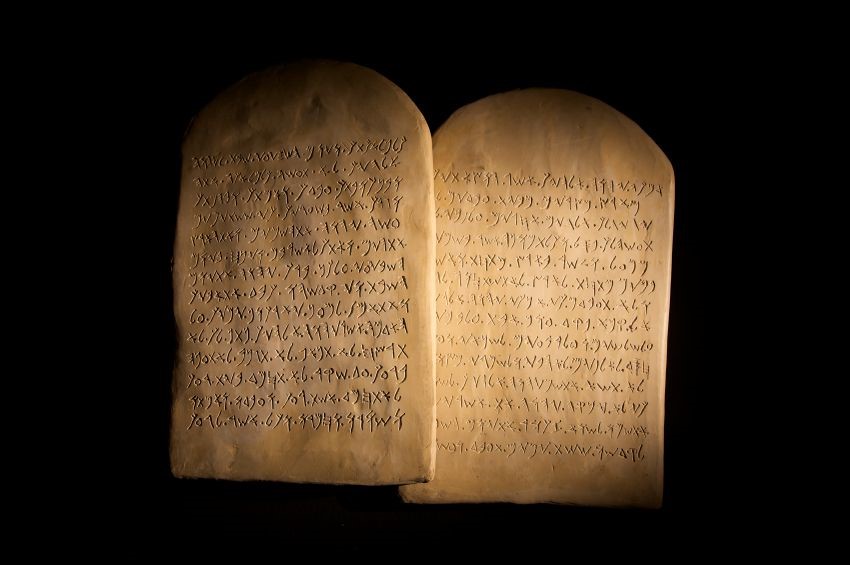
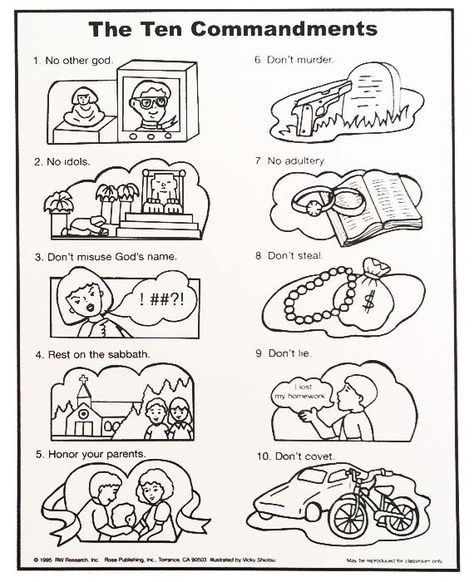
Moses returned to Egypt and persuaded the Hebrews to organize for a quick trip away from their Egyptian slave drivers. With his brother Aaron, Moses informed Pharaoh that the God of the Hebrews demanded that Pharaoh free God's people. Pharaoh refused to comply, bringing upon himself and his people nine terrible plagues: water turned into blood, frogs, gnats, lice, disease in their cattle, boils, hail, locusts, and darkness. Each plague was severe to the Egyptians and their economy but left the Israelites untouched. The tenth plague is now the Hebrew story of Passover. God sent an Angel of Death to kill the firstborn sons of the Egyptians - proof of His immense strength and power. The Israelites protected their households by putting lamb's blood on their doorway, so that the Angel of Death would know to pass over their homes. This last plague broke the Pharaoh's resistance and moved him to grant the Hebrews permission to leave immediately. Moses now found himself the leader of an undisciplined collection of ex-slaves, Hebrew as well as non-Hebrew, escaping from Egyptian territory toward freedom.
The Route of the Exodus
At least three routes of escape from Pithom and Rameses (1:11) have been proposed: (1) a northern route through the land of the Philistines (but see 13:17); (2) a middle route leading eastward across Sinai to Beersheba; and (3) a southern route along the west coast of Sinai to the southeastern extremities of the peninsula. The southern route seems most likely, since several of the sites in Israel's desert itinerary have been identified along it. The exact place where Israel crossed the "Red Sea" is uncertain.
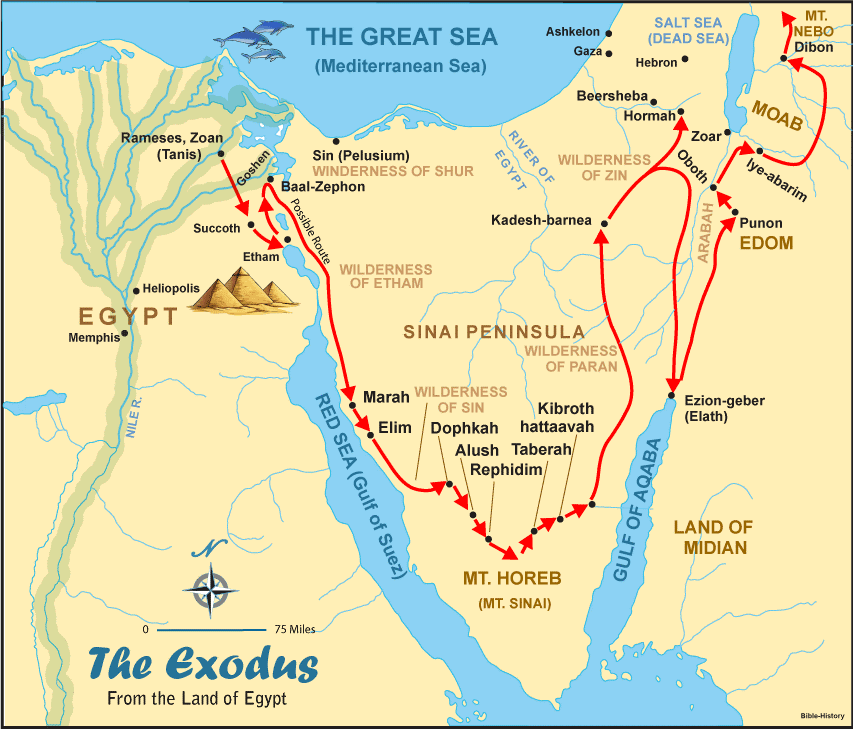
Moses' goal was Mt Horeb (Mt Sinai), where God had first revealed Himself at the burning bush. The Hebrews came to the sacred mountain encouraged by the power they sensed in Moses. Summoned by God, Moses ascended the mountain and received inscribed tablets of stone while the Israelites heard the thundering forth of the Ten Commandments and a code of law regulating their social and religious lives. This collection of instructions, read to and confirmed by the people, was called the Book of the Covenant. These were eventually protected in a specially designed box called the Ark of the Covenant. The Jews regarded Moses as the greatest prophet of all time. Other prophets heard God speaking in dreams & visions; God spoke to Moses face to face (Numbers 12:6-8).
Through 40 years in the wilderness, overcoming obstacles, Moses led these former slaves, shaping them into a nation. Many miracles occurred along the way. When the Israelites stopped in front of the Red Sea with the Egyptian soldiers at their heels, it was Moses' raised staff that parted the Red Sea so that they could cross. Once they had done so, their pursuers drowned as the sea returned to its normal state. When food supplies ran out, God provided "manna" every day for their nourishment. Moses had to hear the people complain constantly about the food, climate, and the slowness of their progress. He had to hear the Israelites claim that Egypt had been better than this wilderness trip. When the people were in need of water, God told Moses to speak to a rock and water would spring from it. Moses' character was apparently worn down because, on one occasion, instead of following directions, he struck the rock with his staff. That was to have lasting impact on Moses's final days and lead to him being excluded from the Promised Land.
With the help of Aaron, Moses was able to hold together his band of ex-slaves for forty years. Only a man with tremendous will, patience, compassion, humility, and great faith could have single-handedly forged the bickering and scheming groups who constantly challenged his wisdom and authority into a nation. Throughout forty years Moses was in constant communication with God as leader and pastor of the nation.
Under Moses' leadership, most of the land east of the Jordan was conquered and given to the tribes of Reuben and Gad and to half of the tribe of Manasseh (these areas are now part of the nation state of Jordan). Moses was not permitted to lead the children of Israel into Canaan. He died in the land of Moab at 120 years of age and was buried opposite Bet Peor. (NB Moses makes an appearance in the New Testament when he appears with Elijah in a meeting with Jesus on the Mountain of the Transfiguration, Matthew 17:3, 4.)
The Tabernacle (lit "dwelling place")
The Old Testament tabernacle, which Moses was instructed by God to set up (Exodus 25:8) was, basically a tent. But this tent was elaborate. It was to be a unique structure, where God would be present among the Israelites. The people were now nomadic. They were to wander through the desert over a forty year period, before they reached the Promised Land. Whenever the presence of God moved they followed. The people of Israel had to go to the tabernacle to find the presence of God.; as Christians we can experience the glory and presence of God through Jesus Christ (2 Corinthians 4:6). There is a lot of typology in the tabernacle, the priesthood, the offerings and the feasts that is relevant to the Gospel. The letter to the Hebrews in the New Testament contains many examples.
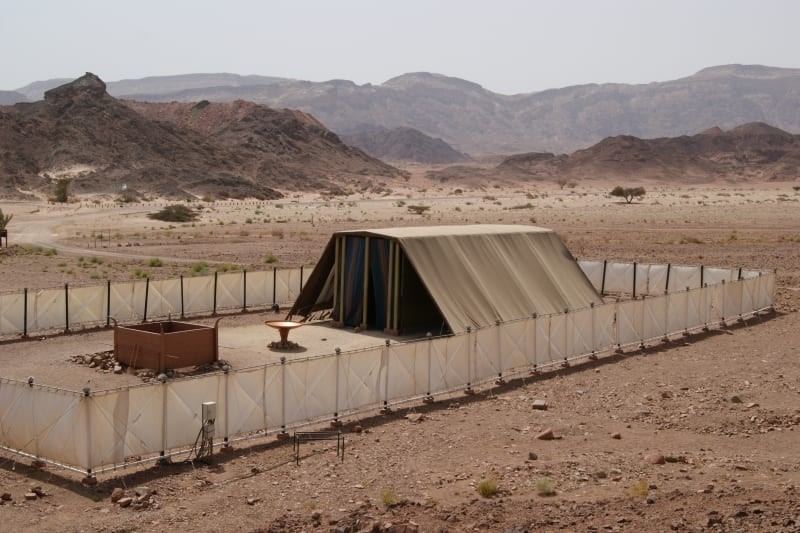
Reproduction of the Tabernacle
Leviticus
The book of Leviticus receives its name from the Septuagint (the pre-Christian Greek translation of the Old Testament) and means "concerning the Levites" (the priests of Israel). It explains how they are to be his holy people and to worship him in a holy manner. Major events: establishment of the Law, the priesthood, offerings and tabernacle, special days. Key ideas: holiness, sacrificial system, Sabbath rest, Sabbatical year.
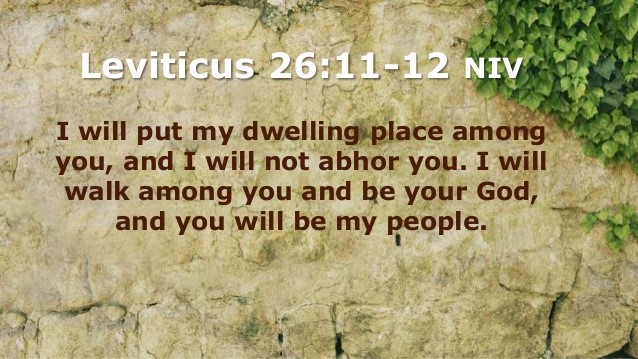
In a short snapshot it is impossible to consider all of the laws in depth. One scholar claims that there are 248 positive commands and 365 negative commands in the Pentateuch. For example, there are laws about marriage and family, motherhood and birth, sexual perversion, prostitution, child sacrifice, approved and prohibited foods, laws about helping the poor, laws about honouring the aged and laws about righteous judgements in dealing with others.
Numbers
Numbers relates the story of Israel's journey from Mount Sinai to the plains of Moab on the border of Canaan. It tells of the murmuring and rebellion of God's people and of their subsequent judgment. There are lots of numbers in this book. Major events: census of Israel, testing of Israel by God, the people grumble, Balaam and his ass. Key ideas: God's faithfulness compared with Israel's rebellion; refusal to enter the land.
Deuteronomy
Deuteronomy ("second" giving of the "Law") served as a reminder to God's people about His covenant. The book was a "pause" before the conquest began and a reminder of what God required. Major events: blessing & curses pronounced, depending on Israel's choice; the deaths of Aaron and Moses. Key ideas: God's presence with His people; preparing to possess the Promised Land.
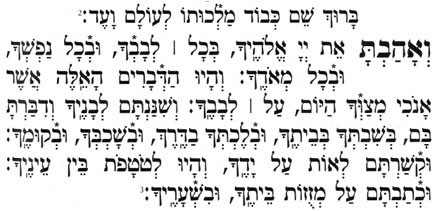
"Shema" God is one.
Deuteronomy also places a strong emphasis on parents teaching their children about God's ways:
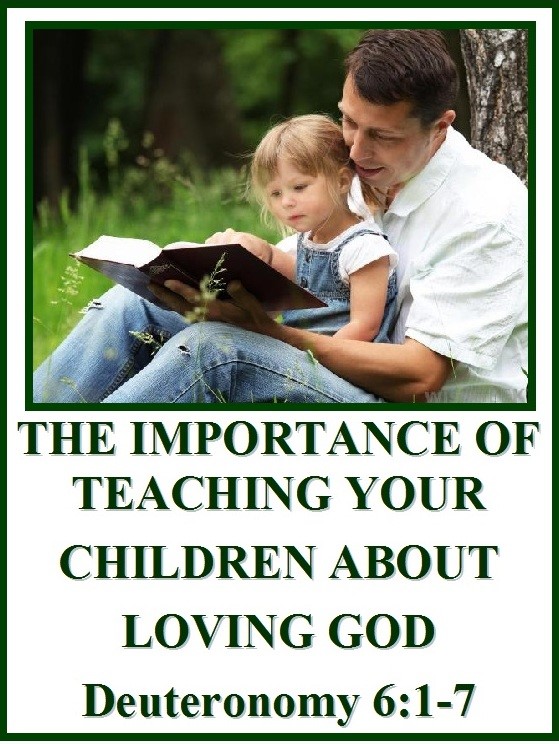
Joshua
The book of Joshua is a story about conquest and fulfillment for the people of God. After centuries of slavery in Egypt and 40 years in the desert, the Israelites were finally allowed to enter the land promised to their fathers. Major events: taking the land, beginning with Jericho. Key ideas: God is faithful; He will keep his promises; we are called to put Him first.
The role of the central human actor in the events narrated here is reinforced by the name he bears. Earlier in his life Joshua was called simply Hoshea (Nu 13:8, 16), meaning "salvation." But later Moses changed his name to Joshua, meaning "The Lord saves" (or "The Lord gives victory"). When this same name (the Greek form of which is Jesus) was given to Mary's firstborn son, it identified him as the servant of God who would complete what God did for Israel in a preliminary way through the first Joshua, namely, overcome all powers of evil in the world and bring God's people into their eternal "rest" (see Heb 4:1-11).
In Joshua it was the Lord who won the victories and "gave Israel all the land he had sworn to give their forefathers" (21:43).
Joshua was known for his deep trust in God and as "a man in whom is the Spirit" (Nu 27:18). As a youth he had lived through the bitter realities of slavery in Egypt, but he had also witnessed the supernatural plagues and the miracle of Israel's escape from the army of the Egyptians when the waters of the sea opened before them. In the Sinai Peninsula it was Joshua who led the troops of Israel to victory over the Amalekites (Ex 17:8-13). He alone was allowed to accompany Moses up the holy mountain where the tablets of the law were received (Ex 24:13-14). And it was he who stood watch at the temporary tent of meeting Moses set up before the tabernacle was erected (Ex 33:11).
Joshua was elected to represent his own tribe of Ephraim when 12 spies were sent into Canaan to look over the land. Most returned filled with doubt and their pessimistic reports led to the people fearing to go forward. Only Joshua and Caleb (who did not doubt God's power to confront the enemies they had seen), representing the tribe of Judah, were ready to follow God's will and take immediate possession of the land (see Nu 14:26-34). The rest of the Israelites of that generation were condemned to die in the desert. Even Moses died short of the goal and was told to turn everything over to Joshua. God promised to guide and strengthen Joshua, just as he had Moses (Dt 31:23; cf Jos 1:5).
Joshua was God's chosen servant (see 24:29) to bring Moses' work to completion and establish Israel in the Promised Land. To that special divine appointment he was faithful -- as the leader of God's army, as the administrator of God's division of the land and as God's spokesman for promoting Israel's covenant faithfulness. In all this he was a striking Old Testament "type" of Christ (Heb 4:1, 6-8).
Much of the data from archaeology appears to support a date for Joshua's invasion c. 1250 B.C. This fits well with an exodus that would then have taken place 40 years earlier under Rameses II, who ruled from the Nile delta at a city with the same name (Ex 1:11). It also places Joseph in Egypt in a favorable situation. Four hundred years before Rameses II the pharaohs were the Semitic Hyksos, who also ruled from the delta near the land of Goshen.
At the time of the Israelite migration into Canaan the superpowers of the ancient Near East were relatively weak. The Hittites had faded from the scene. Neither Babylon nor Egypt could maintain a standing military presence in Canaan, and the Assyrians would not send in their armies until centuries later.
As the tribes circled east of the Dead Sea, the Edomites refused them passage, so Israel bypassed them to the east. However, when Sihon and Og, two regional Amorite kings of Transjordan, tried to stop the Israelites, they were easily defeated and their lands were occupied. The Moabites (descendants of Abraham's nephew Lot) were forced to let Israel pass through their territory. Moab's fear of the Israelites caused their King Balak to summon a prophet named Balaam to curse them, but God caused Balham to bless Israel instead. The Midianites were dealt a severe blow.
The book of Joshua is a story of conquest and fulfillment for the people of God. After many years of slavery in Egypt (working on Pharaoh's massive building projects) and 40 years wandering in the desert, the Israelites were finally allowed to enter the land promised to their ancestors. Abraham, always a migrant, never possessed the country to which he was sent, but he left to his children the legacy of God's covenant that made them the eventual heirs of all of Canaan (see Ge 15:13,16,18; 17:8). Joshua was destined to turn that promise into reality.
There is an interesting account of an experience that Joshua had before he took the Children of Israel over the Jordan River into the promised land. The "Commander of the Lord's Army" appeared before him with a drawn sword in his hand (5:14). Read the account. Some people believe that this was a visible appearance of God (a theophany). It may (alternatively) have been an angel. We cannot be sure. However, the experience was a reminder to Joshua that God would be with him during the campaign.
As the book of Joshua begins the tribes of Israel are still camped on the east side of the Jordan River. Moses is dead and leadership of the nation has passed to Joshua. The narrative opens with God's command to move forward and pass through the river on dry land. Then it relates the series of victories in central, southern and northern Canaan that gave the Israelites control of all the hill country and the Negev. It continues with a description of the tribal allotments and ends with Joshua's final addresses to the people.
The theme of the book is the establishment of Israel in the land, the land God he had promised to give them as their place of "rest" in the earth (1:13,15; 21:44; 22:4; 23:1; see also Dt 3:20; 12:9-10; 25:19; 1Ki 5:4).
Because of Canaan's topography and location there was little political unity among the groups of people who lived there. Chunks of territory were controlled by independent fortified city states. Altogether Joshua defeated 31 kings of city states. When the conquest was finished there were still a few areas that not been captured; these would be troublesome later on.
What's more, the religions of the Canaanites were not eliminated either, so they remained stumbling blocks to the Israelites. The people who lived in Canaan were polytheistic, that is, they worshipped many gods. The most important were Asherah and Baal. The Old Testament is clear that the brutality and immorality of the people who worshipped these false gods (and carried out child sacrifice, religious prostitution, snake worship and other rituals) were detestable to the holy God of Israel, the one true God.
Failure to root out these practices led many in Israel to adopt the same way of life over time, which inevitably brought judgement upon them, with recurring cycles of apostasy, repentance, and salvation in Israel. We will see more of this in week 3.
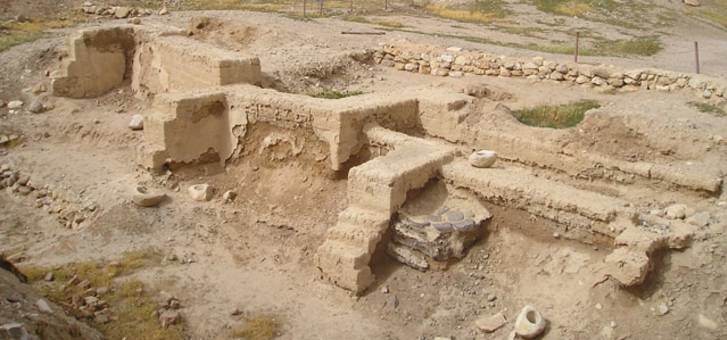
"By faith the walls of Jericho fell, after the army had marched around them for seven days." (Hebrews 11:30).
(The New Testament genealogies, long lists of names, are important. For example, Mt 1:5-6 tells us that Rahab, from Jericho, was King David's great-great-grandmother.)
While some accounting is inconclusive, the campaigns of Joshua must have occupied at least five or seven years for their accomplishment.
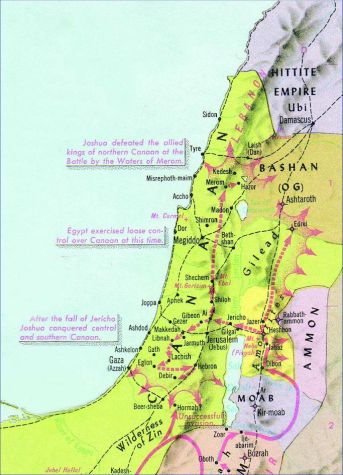
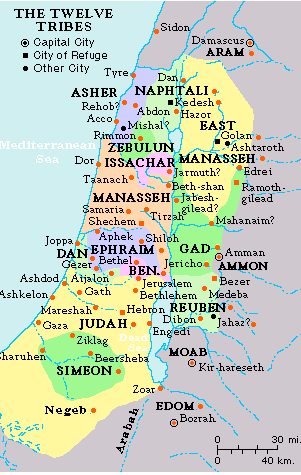
Occupation of the land.
God's Nature Revealed in His Names
Our names have meanings. The ancient Hebrews deliberately chose names based on interpretations. Examples of the use of names in Scripture to express character or prophecy:
| Abram > Abraham | Multitude of Nations |
| Sarai > Sarah | Princess
|
| Jacob | Deceiver, became Israel = strives with God and prevails
|
| Joshua (Heb.) > Jesus (Gk.) | Saviour
|
| Messiah (Heb.) > Christ (Gk.) | Anointed
|
God's names likewise reveal His character. To take His name in vain was forbidden (Exodus 20:7). God stands by His name (1 Samuel 12:22). It is our "strong tower" (Proverbs 18:10) and we are called to sanctify it (or keep it holy), cf Matthew 6:9.
- El = God: Creator, omnipotent. Appears more than 250 times in the Old Testament. Plural form = Elohim in Genesis indicated plurality (more than 2,310 other times) > Trinity
Elyon = Most High, Exalted God (Genesis 14:17-20, Isaiah 14:13-14). God is transcendent over man and the universe, not subject to them (the ancient Greeks played with and manipulated their gods). This contrasts with the folly of idolatry, where people make gods and worship them.
El Shaddai = God Almighty; All Sufficient One (Genesis 17:1, Exodus 6:3, Psalm 91:1)
El Olam = Everlasting God (Genesis 21:33; Isaiah 40:28-31)
El-Roi = "The strong one who sees" (Genesis 16:13)
- Jehovah = Lord - Covenant name. First used in Genesis = "To Be" = all existent, all sufficient. Without tense (was, is, is to come). Used 7,000+ times in the Old Testament. Often expressed as LORD in English. Known as the Tetragrammaton JHWH. Jews refused to pronounce. Ritually bathed before writing the name in scrolls. Discussion - Should we call God Jehovah?
Jehovah-Mekadish-Kem.......Exodus 31:13 "The Lord your sanctifier" We rest in His redemptive work to make us whole, by His work in us (Hebrews 4:9, 10).
Jehovah-Ra'ah......Psalm 23:1 "The Lord is my shepherd". Jesus is our Good Shepherd (John 10; 1 Peter 5:4).
Jehovah-Shammah.......Ezekiel 48:35 - "The Lord who is present". Jesus is with us, Matthew 28:20 (cf Matthew 18:20) The Holy Spirit abides with us continually.
Jehovah-Rapha.........Exodus 15:26 - "The Lord our healer". Healing is in our redemption.
Jehovah-Tsidkenu......Jeremiah 23:5, 6; 33:15-16 - "the Lord our righteousness" Jesus is our righteousness (2 Corinthians 5:21; Romans 3:26; 1 Corinthians 1:30).
Jehovah-Jireh.........Genesis 22:13-14 - "The Lord will provide" God provided the lamb (Jesus); many other examples of provision: manna, oil, meat, water, cf Philippians 4:19.
Jehovah-Nissi.........Exodus 17:15 - "The Lord our banner". God fights against our enemies; we lift up His name as our banner.
Jehovah-Shalom........Judges 6:24 - "The Lord is peace" - He is our peace; we have peace with God (Romans 5:1).
Jehovah-Sabbaoth......Isaiah 1:9; 6:1-3 - "The Lord of Hosts", cf Romans 9:29; James 5:4.
Jehovah Yasha-Gaal = the Lord our Saviour and Redeemer (Isaiah 49:26; 60:16).
- Adonai......Exodus 23:17, Isaiah 10:16, 33; Malachi 1:6 - "Lord", a reference to the Lordship of God.
Reflection
- Deuteronomy 29:5, 6 - ""During the forty years that I led you through the wilderness, your clothes did not wear out, nor did the sandals on your feet. You ate no bread and drank no wine or other fermented drink. I did this so that you might know that I am the Lord your God." But the people forgot God, became ungrateful and lost heart, faith and the promise. How can you keep God's love and provision uppermost in your thinking and be a person of gratitude?
- Joshua 1:7-9 "Be strong and very courageous. Be careful to obey all the law my servant Moses gave you; do not turn from it to the right or to the left, that you may be successful wherever you go. Keep this Book of the Law always on your lips; meditate on it day and night, so that you may be careful to do everything written in it. Then you will be prosperous and successful. Have I not commanded you? Be strong and courageous. Do not be afraid; do not be discouraged, for the Lord your God will be with you wherever you go." How can we live out this set of promises in our own lives?
- Joshua 24:15 "... as for me and my household, we will serve the LORD.". Every family and individual faces choices as to who will be first and in charge. How can you bring this order into your own life?
- Hebrews 11:25-27 tells us that Moses endured and served God because of faith. "He chose to be mistreated along with the people of God rather than to enjoy the fleeting pleasures of sin. He regarded disgrace for the sake of Christ as of greater value than the treasures of Egypt, because he was looking ahead to his reward. By faith he left Egypt, not fearing the king's anger; he persevered because he saw him who is invisible." How can we put these great truths into practice in our own lives?
- The law was given by Moses, but grace and truth came by Jesus Christ (John 1:17). Moses' ministry brought knowledge of the law. But the law could only show us how sinful and broken we were (Romans 3:20). Rather than just bringing us truth, Jesus also brought us grace. Instead of simply telling us that we were broken, Christ gave us a way to fix what was wrong. This is an important theme of the Bible. What are you relying on for your relationship with God? Legalism or faith in the work of the one "like Moses" (Deuteronomy 18:15-19)?
- "God is not a man that he should lie" (Numbers 23:19). Do you trust His word, His promises and His purpose for your life?










